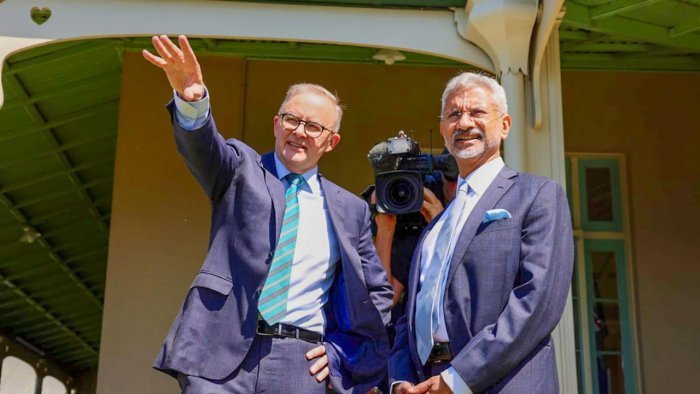Soros is old, rich, and dangerous, says Jaishankar, who calls this “fear psychosis.”

A few days after billionaire investor George Soros criticised Prime Minister Narendra Modi and said the turmoil over the Adani Group crisis could “open the door to a democratic revival” in the country, External Affairs Minister S Jaishankar called Soros “old, rich, opinionated, and dangerous,” and accused him of “scaremongering.”
Soros’s comment “worries” India because it knows how dangerous “outside interference” in politics can be, said Jaishankar, referring to India’s time as a colony. On Friday, BJP leader and Union Minister Smriti Irani responded to Soros by saying that he was trying to interfere with India’s democratic process and that he wanted a government that would do what he wanted.
In Sydney, in response to a question, Jaishankar said that people like Soros are dangerous because they “invest resources in shaping narratives” under the guise of supporting an open society.
“I could say that the person in question, Mr. Soros, is an old, rich, opinionated person sitting in New York who still thinks that his ideas should decide how the whole world works. Now, if I could stop at old, rich, and opinionated, I’d put it away. “But he’s old, rich, has strong opinions, and is dangerous,” Jaishankar said.
He was answering a question about “occasional comments” about the weakening of democracy in India. The question was about the IT department survey at the BBC office in New Delhi and the things Soros said before the Munich security conference.
Soros said in a speech on Thursday that the turmoil over Gautam Adani’s business empire has shaken faith in India and made investors nervous. He said this could “open the door to a democratic revival” in the country.
Soros, who has given money to Democratic candidates for president in the US over the years, said the Prime Minister will have to “answer questions” from foreign investors and Parliament about the allegations against the Adani firms. He had said, “Modi and business magnate Adani are close friends, and their fates are tied together.”
“How do you explain this, especially to Quad ministers, but also to other people?” The head of the Australian Strategic Policy Institute, Justin Bassi, asked Jaishankar, who was standing next to Australia’s Minister for Climate Change and Energy, Chris Bowen.
In a sharp response, Jaishankar said that not everyone sees that the world is “changing, rebalancing, and becoming less Euro-Atlantic” because “old habits die hard.”
This is part of the External Affairs Minister’s long-term political pushback against people in the West who often criticise what they call India’s “democratic backslide.”
“There are still people in the world who think that their definition, their preferences, and their views must be the most important. I’m not sure how people know what was said at the Munich conference since you brought up this specific example. Soros basically said that India is a democratic country, but he doesn’t think that the Prime Minister of India is a democratic person. And by the way, I was at the same conference a few years ago when he said we were planning to take away the citizenship of millions of Muslims, which didn’t happen. “That was a stupid idea,” Jaishankar said.
Jaishankar called these kinds of comments “scaremongering” and said that they hurt our society. He said that Soros, who started the Open Society Foundations, also makes “fear psychosis.”
“This kind of scaremongering, like saying that millions of people will lose their citizenship, does real damage to the way our society works. Because someone out there thinks you are right. And you don’t just let it happen by accident; you back it up with an operation. So you make that kind of fear psychosis and then use it to back up your original judgement,” he said.
Jaishankar pointed out that it is clear that Soros has “very strong political preferences.” He did this by listing India’s democratic credentials, including the fact that people can vote for leaders and help form governments.
“He really doesn’t care that there are 1.4 billion people in this country and that their votes decide how it should be run. Again, I use him as a really bad example. But this happens in other ways in other countries, where people think like him that an election is good if the person we want to win does.
A democracy is called “flawed” if the election results don’t match what people like Soros expect, he said. “All of this is done under the guise of promoting an open society, transparency, and so on,” he added.
“So, people of our generation have grown up with ideas like regime change…
“Now, you can call it whatever you want, but it looks the same with some kind of “do-goodism” on top of it,” the minister said.
India is not one of the countries where election results are contested in court, Jaishankar said, because it has high voter turnout and clear election results.
“It (Soros’s comments) worries us because we are a country that was colonised. We know how dangerous it can be when people from outside your country try to influence your politics in any way,” he said.
Soros’s comments that the turmoil over Adani’s business empire has shaken faith in India and threatened investor confidence, which could “open the door to a democratic revival” in the country, have caused a big fight and gotten sharp responses from the ruling BJP.
Saturday, Jaishankar also met Australian Prime Minister Anthony Albanese and Foreign Minister Penny Wong in Sydney.
Before Albanese’s trip to India at the beginning of next month, they talked about the Indo-Pacific region, cricket, and the strategic partnership between the two countries.



